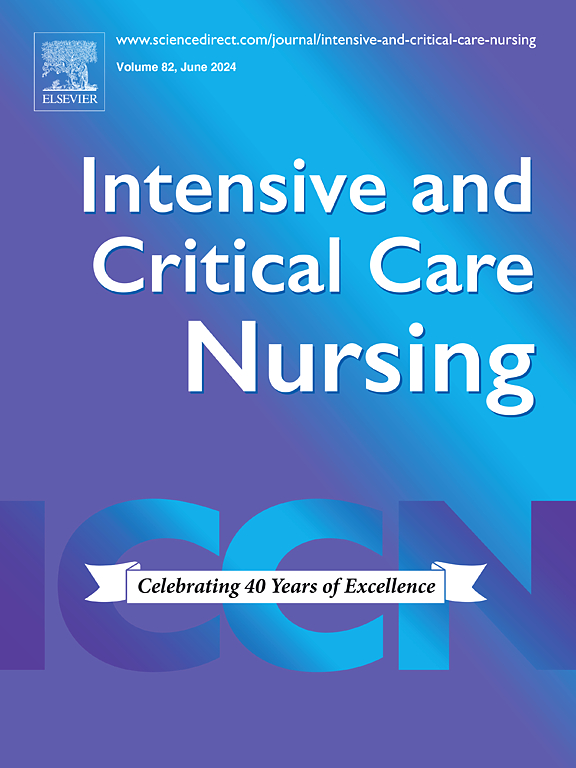Nil by mouth in intensive care – A qualitative, multiformat survey exploring the impact of mandatory oral restriction, from the health care providers perspective
IF 4.9
2区 医学
Q1 NURSING
引用次数: 0
Abstract
Introduction and objectives
Nil by mouth (NBM) is a frequent imposition for patients recovering from critical illness.
Its impact on patients’ wellbeing and rehabilitation is under researched. We sought ICU multidisciplinary opinion to primarily assess the relevance of taste deprivation on patient care and recovery, and to identify future opportunities for innovation and research.
Methodology
A descriptive, multiformat, observational, online survey investigated the experiences of specialist multidisciplinary healthcare professionals (HCP) from two academic hospitals regarding working with NBM patients. An e-survey containing 16 multiformat questions was developed by an experienced multidisciplinary HCP team and distributed over a 3-month period in 2023. The CHERRIES guidelines were followed for reporting of results.
Results
58 HCPs completed the study. 97% of HCPs reported witnessing patient discomfort or distress when NBM. 91% believed felt that it impacted negatively on patients’ engagement in their own recovery. 59% did not discuss food and taste with patients when prolonged NBM was anticipated because there was no solution on offer. 41% of HCPs did discuss flavour and food, to build rapport and help motivate recovery. 57% of HCPs often felt pressure to give oral food/liquid to a NBM patient. 90% of participants reported that a safe taste product could enhance a patient’s ICU experience. Concerns regarding safety and a need for guidelines to enable implementation were common.
Conclusion
HCPs recognise the psychological sequalae on the patient and the impact on their relationship with the patient, that taste deprivation creates in recovering critically ill patients. Safe alternatives to oral intake that can enhance the ICU experience are considered desirable; this needs further research and innovation. Furthermore, with training and support HCPs should feel empowered to discuss NBM associated distress and challenge NBM recommendations.
Implications for clinical practice
There is demand for safe alternatives to oral flavour intake and belief this could enhance the ICU experience with downstream positive impact on ICU morbidity.
重症监护中的口服零-一项定性,多格式的调查,从卫生保健提供者的角度探讨强制性口服限制的影响。
简介和目的:口服零氧(NBM)是一种常见的强制病人从危重疾病恢复。它对患者健康和康复的影响还在研究中。我们寻求ICU多学科的意见,主要评估味觉剥夺与患者护理和康复的相关性,并确定未来创新和研究的机会。方法:一项描述性、多格式、观察性的在线调查调查了来自两家学术医院的多学科医疗保健专业人员(HCP)在处理NBM患者方面的经验。一个经验丰富的多学科HCP团队开发了一个包含16个多格式问题的电子调查,并于2023年分发了3个月。结果报告遵循了樱桃指南。结果:58名HCPs完成了研究。97%的医护人员报告说,他们看到病人在接受新医学治疗时感到不适或痛苦。91%的人认为这对患者参与自己的康复产生了负面影响。由于没有解决方案,59%的医生在预期会出现长时间的NBM时不会与患者讨论食物和味道。41%的医护人员确实会讨论味道和食物,以建立融洽的关系,并有助于促进康复。57%的医护人员经常感到有压力,要给NBM患者口服食物/液体。90%的参与者报告说,安全口味的产品可以提高患者在ICU的体验。对安全的关注和需要指导方针以使实施成为可能是普遍的。结论:HCPs认识到味觉剥夺对患者的心理后遗症以及对他们与患者关系的影响,这在恢复危重患者中造成。口服摄入的安全替代品可以增强ICU的体验是可取的;这需要进一步的研究和创新。此外,通过培训和支持,医护人员应该感到有能力讨论与新医学相关的痛苦和挑战新医学的建议。对临床实践的影响:有对口服香料摄入的安全替代品的需求,并相信这可以增强ICU的经验,对ICU发病率有下游的积极影响。
本文章由计算机程序翻译,如有差异,请以英文原文为准。
求助全文
约1分钟内获得全文
求助全文
来源期刊

Intensive and Critical Care Nursing
NURSING-
CiteScore
6.30
自引率
15.10%
发文量
144
审稿时长
57 days
期刊介绍:
The aims of Intensive and Critical Care Nursing are to promote excellence of care of critically ill patients by specialist nurses and their professional colleagues; to provide an international and interdisciplinary forum for the publication, dissemination and exchange of research findings, experience and ideas; to develop and enhance the knowledge, skills, attitudes and creative thinking essential to good critical care nursing practice. The journal publishes reviews, updates and feature articles in addition to original papers and significant preliminary communications. Articles may deal with any part of practice including relevant clinical, research, educational, psychological and technological aspects.
 求助内容:
求助内容: 应助结果提醒方式:
应助结果提醒方式:


